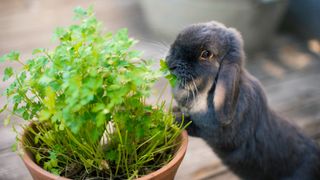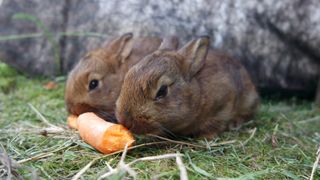Are rabbits herbivores or omnivores? A guide to your bunny's diet
We answer the question 'are rabbits herbivores?' and provide guidance on what to feel your floppy-eared friend for optimal health and wellbeing

Are rabbits herbivores? If you’re about to welcome a floppy-eared friend into your family and have already invested in one of the best rabbit hutches and a few toys, the next thing you’re going to want to learn is what to feed your bunny for optimal health and wellbeing.
Rabbits are indeed herbivores, which means their bodies have been designed to eat vegetables and herbs. That’s not to say that they’ll become terribly ill from accidentally ingesting the odd small piece of meat from time to time, but for your bunny to thrive, a plant-based diet is essential.
When it comes to the do's and don'ts of feeding rabbits correctly, sticking to plant and herb materials is vital for several reasons. Not only does all that crunching on fibrous vegetables help them to shed their teeth, but their gastrointestinal tract has not been designed to process large amounts of protein, meaning a plant-based diet is essential for their digestive health.
Below, we reveal everything you need to know about your herbivorous fur friend, including the health issues that can occur from improper feeding and exactly what their diet needs to entail to keep them functioning at their physical best. Let's take a look....
Are rabbits herbivores?
Rabbits are obligate herbivores which means they must consume a strict plant-based diet. The reason for this is that rabbits require a lot of fiber in their diet to help them wear down their four front teeth which are continually growing. Fibrous foods provide the roughage they need to achieve this.
From an evolutionary perspective, there’s also another reason that rabbits have always been herbivores and that’s to do with the role it plays in their survival. For rabbits living in the wild, consuming plant-based foods allows them to eat out in the open where they can keep an eye out for predators.
Hay, plants and herbs are also much lighter in their stomach than protein-rich foods, allowing them to move quickly if they detect a threat. So, as you can see, being a herbivore is an adaptive strategy that ensures our floppy-eared friends have the best change of staying alive.
Can rabbits eat meat?
If your rabbit consumes a tiny sliver of bacon or other kind of meat, rest assured that while it may cause stomach issues, it’s unlikely to do them any serious harm. It’s not that these foods are immediately toxic to rabbits, but that their digestive systems aren’t designed to break down the higher protein content found in meat.
Rabbits in the wild will eat meat when they’re starving and need to stay alive, however it’s important you don’t deliberately feed your own bunny meat as their inability to digest it can make them ill and cause health issues.
Small amounts of meat consumed accidentally can cause minor problems, such as loose stools, but excess amounts of animal products on a regular basis can be fatal. Always stick to plants for your bunny and you’ll ensure they get the nutrients they need to thrive.
Potential health problems from improper feeding

Good nutrition is crucial when it comes to maintaining your bunny’s health with improper feeding being one of the most common causes of disease in pet rabbits. Here are some health issues that can arise if your floppy-eared friend is not fed the correct diet:
- Enteritis - A result of eating too many carbohydrates, enteritis causes the intestines to become inflamed and if left untreated, it can develop into enterotoxemia, a disease of the kidneys that’s triggered by high levels of pathogenic bacteria.
- Gastrointestinal ileus - If your rabbit gets too little fiber or too many carbohydrates another potential problem is gastrointestinal ileus, a potentially deadly condition where the digestive system slows down or stops working completely.
- Dental disease - Your rabbit’s teeth are continuously growing and the only way for them to keep their chompers at the proper height and shape is to do a lot of chewing. Plenty of hay is vital to ensure their teeth stay in tip-top condition.
- Hairballs - For rabbits that aren’t getting enough hay and other plant-based materials, hairballs are common. Rabbits groom themselves frequently and consuming adequate hay and other plant foods high in fiber helps to move the hair through the digestive tract so that it can be eliminated.
- Pregnancy toxemia - Pregnant or lactating rabbits who do not get the nutrients they need from plant-based foods can go into a state of ketosis, which can result in seizures and death.
- Urinary stones - A diet that’s high in calcium (from animal-based products) can cause what’s known as sludge in the urinary bladder which can lead to stones and calcification of the kidneys.
As you can see, poor nutrition is responsible for a wide range of health conditions in rabbits that are far less likely to occur when they’re fed a proper diet that contains the correct ratio of vitamins and minerals that their bodies need. With that in mind, let’s take a look at what to feed your floppy-eared friend for optimal health.
What to feed a rabbit
Being obligate herbivores, your bunny’s daily diet should consist mainly of hay, greens, a small amount of fruit and plenty of water. Even with plant-based foods, which are what your rabbit is designed to eat, it’s always a good idea to monitor the introduction of any new fruit or vegetable to ensure your bunny is able to tolerate it.
To help ensure you’re feeding your fur friend the right diet, here’s a list of plant-based foods that are suitable for your bunny to consume:
- Hay - The healthiest choice when it comes to a staple food to have in your bunny’s diet is hay. Timothy, orchard grass, oat hay, or a mixture are all suitable options. Unless your rabbit is pregnant, lactating or a growing youngster, steer clear of alfalfa hay, which is high in calcium and can cause health issues.
- Greens - The rule of thumb with greens is to offer your rabbit one cup per two to three pounds of body weight. Include a good mix to supply a wide range of nutrients - think spinach, romaine lettuce, kale, mustard greens, peppermint leaves, radish and carrot tops, collard greens, dandelion greens and cilantro. Make sure all greens are pesticide-free and because the darker the green the higher in calcium it is, feed these less often than lighter greens.
- Fruits and vegetables - You can offer around one tablespoon daily of fruits or vegetables per two to three pounds of body weight to add variety into your bunny’s diet. Strawberries, blueberries and raspberries are all suitable, as are things like kiwifruit, pineapple, peaches and pears.
For more information on particular foods and whether they are suitable for your rabbit to consume, you may find the following articles helpful:
PetsRadar Newsletter
Get the best advice, tips and top tech for your beloved Pets

Kathryn is a freelance writer who has been a member of the PetsRadar family since it launched in 2020. Highly experienced in her field, she's driven by a desire to provide pet parents with accurate, timely, and informative content that enables them to provide their fur friends with everything they need to thrive. Kathryn works closely with vets and trainers to ensure all articles offer the most up-to-date information across a range of pet-related fields, from insights into health and behavior issues to tips on products and training. When she’s not busy crafting the perfect sentence for her features, buying guides and news pieces, she can be found hanging out with her family (which includes one super sassy cat), drinking copious amounts of Jasmine tea and reading all the books.
